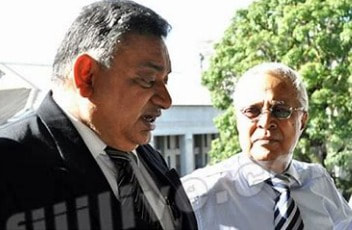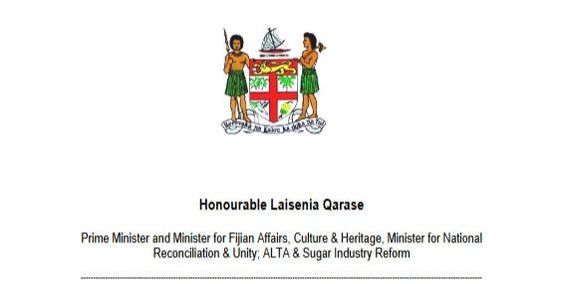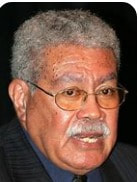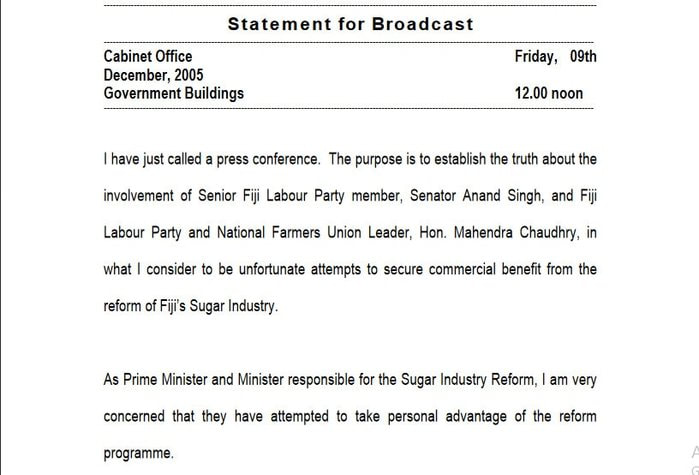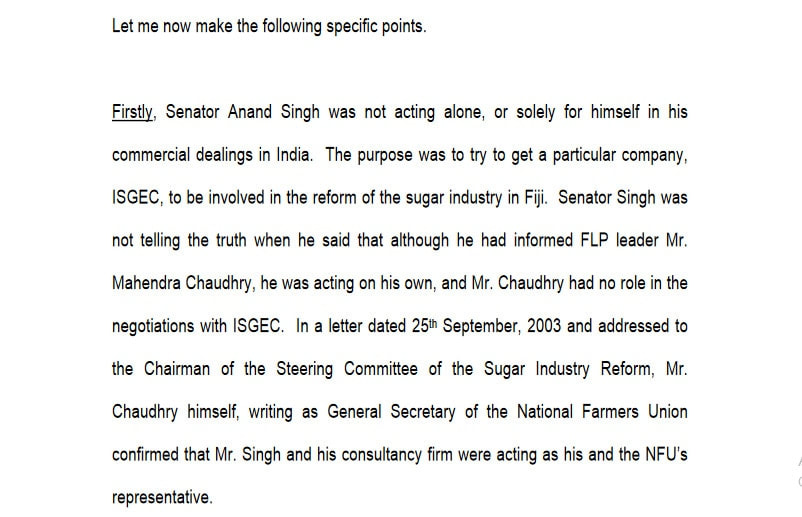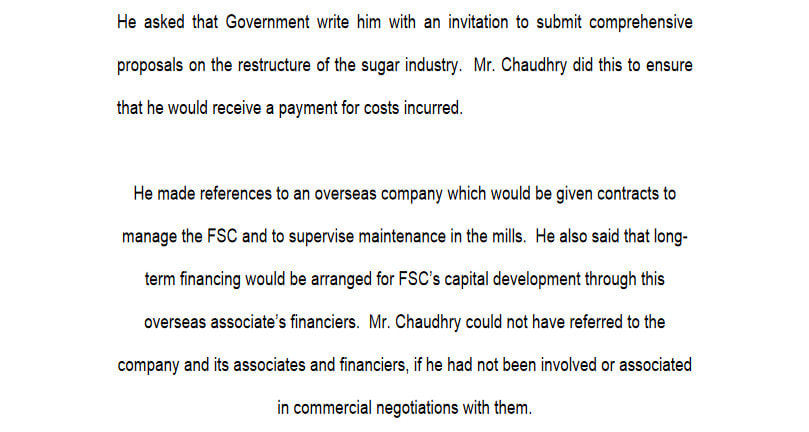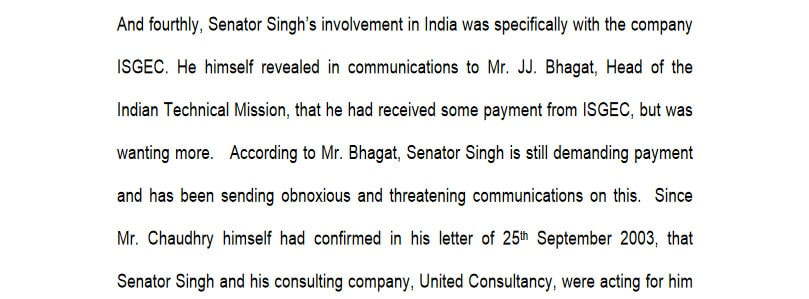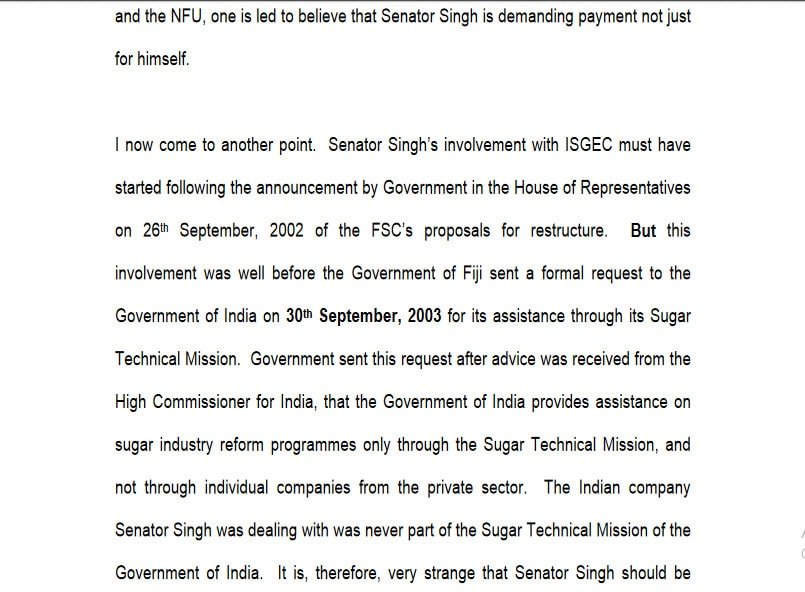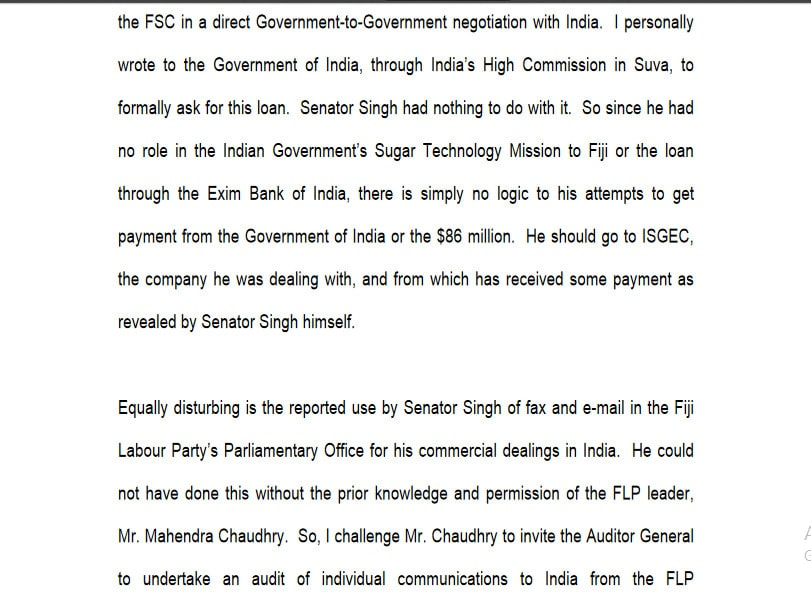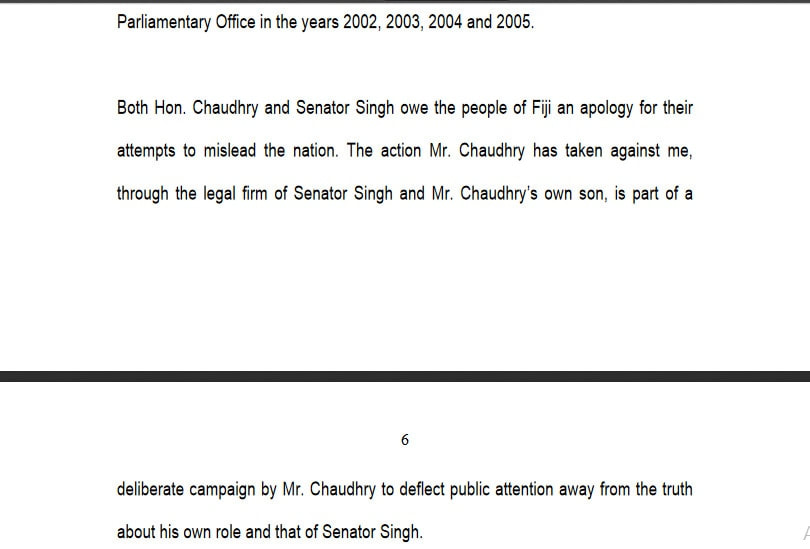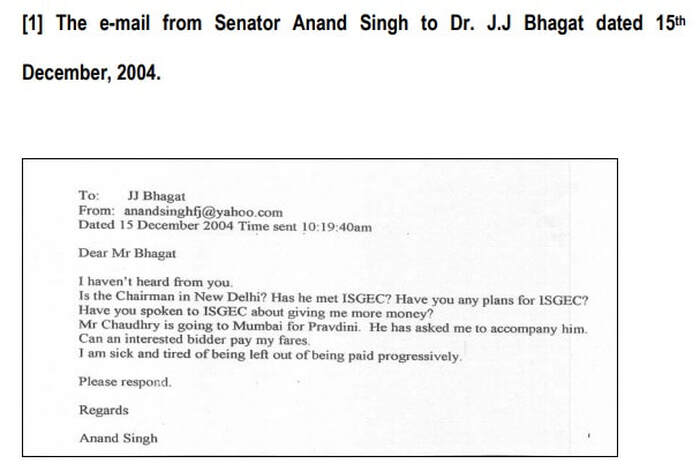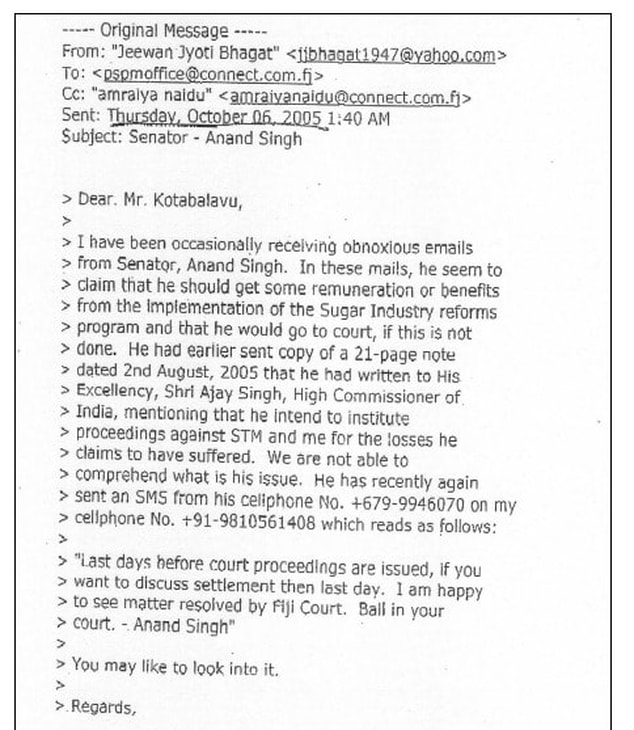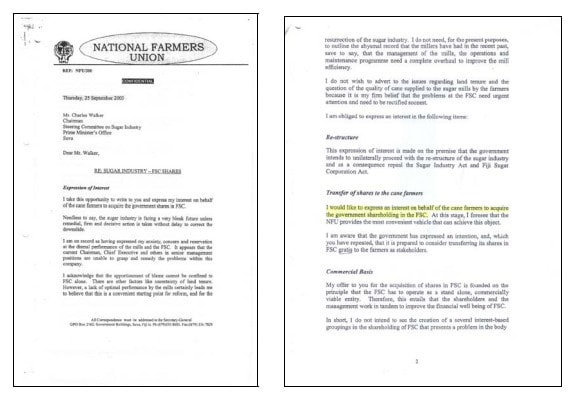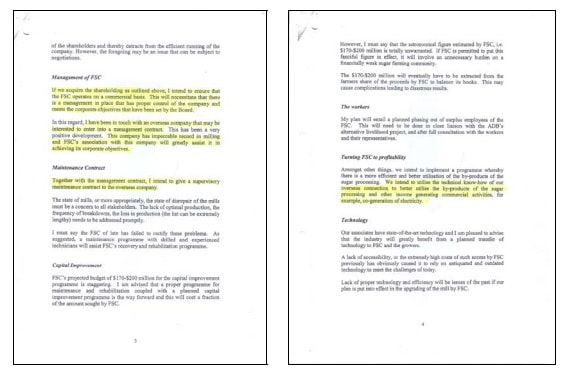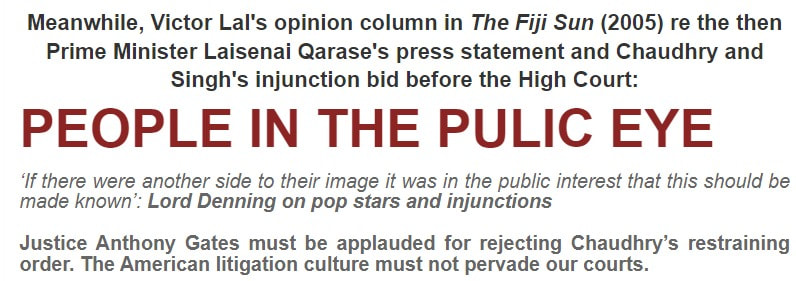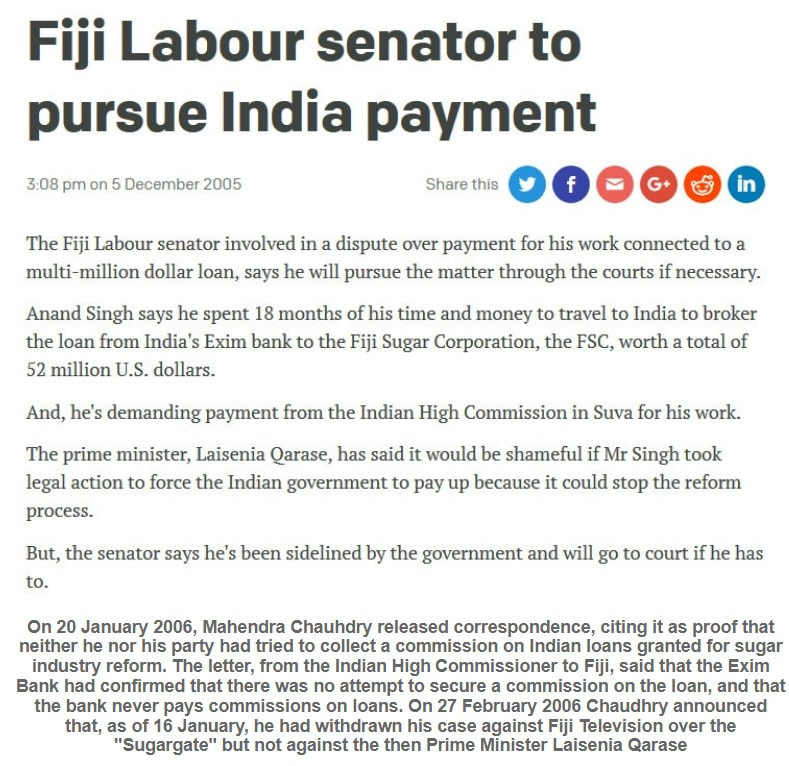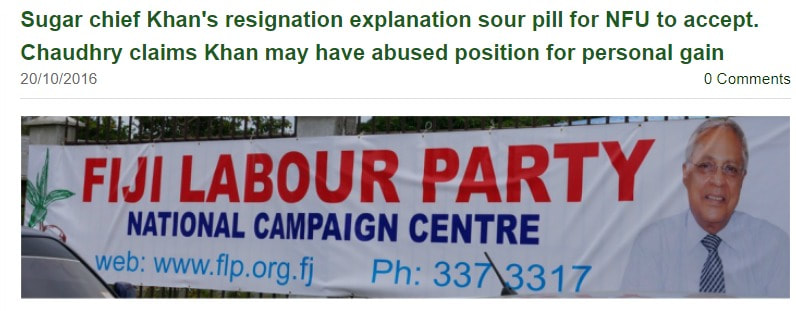In 2005, our Founding Editor-in-Chief, writing for the Fiji Sun, and based on documents leaked to him from the late Prime Minister Laisenia Qarase's office, had claimed that FLP's former Attorney-General Anand Singh (now deceased) and Mahendra Chaudhry's National Farmers Union were embroiled in the Exim Bank of India loan deal.
*Later, Qarase revealed more details in Parliament, prompting Chaudhry to challenge Qarase to repeat the claims in public, which Qarase did with supporting documents.
*Chaudhry sued Qarase for defamation, with Anand Singh insisting that the Indian government pay him commission for allegedly negotiating the loan deal.
*Qarase had accused Singh, Chaudhry and NFU of attempting to secure commercial benefit from the reform of Fiji’s Sugar Industry.
*Chaudhry vehemently denied the claims, resulting in court action.
*Two decades later, both Laisenia Qarase and Anand Singh are dead but the ghost of that loan deal is still like an albatross around Fiji's neck.
SUGARGATE - Bittersweet, terribly BITTER LEGACY rages on, Fiji.
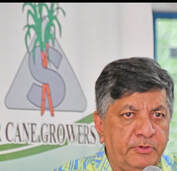 Sugar minister Singh
Sugar minister Singh Sugar Industry Minister Charan Jeath Singh says he has been advised by the Indian Government that they cannot convert the Exim Bank loan into a grant. Singh received this communication during his recent visit to India. Earlier, Singh had informed FBC News that efforts were underway to convert the initial $102 million loan taken by the Fiji Sugar Corporation into a grant. The firm tasked with executing the project allegedly failed, resulting in substantial debt for the FSC. Singh explains that the Indian Government clarified they cannot write off the loan, as they have similar arrangements with numerous African countries. He says that if India were to convert FSC’s loan into a grant, it would set a precedent for other African countries “What they have done, a counter-proposal to us, is that whatever the total amount of loan as of today, they will write off all the interest, and they will basically nullify all the interest part, and then they will block it. So, there will be no more interest to be charged. We are only supposed to pay them the principal.” Singh says they are negotiating to pay the loan within the next 15 years. Source: FBC News, 7 March 2024.
By VICTOR LAL
IT MUST HAVE COME as a great sigh of relief to the champions of free and open press when High Court judge, Justice Anthony Gates, dismissed an application by the Fiji Labour Party leader Mahendra Pal Chaudhry to restrain the media from airing public statements made by the Prime Minister at a press conference on 9 December regarding the bittersweet ‘sugargate’ saga. I had already pointed out in a previous column of mine that there were no legal grounds for the restraining order.
In his ruling Justice Gates highlighted that Chaudhry had failed to satisfy the court that the Prime Minister in relation to the alleged sugar restructure deal made false statements. Chaudhry has been ordered to pay $750 as court costs to the Prime Minister and to Fiji TV by the 9 of January 2006. Justice Gates also highlighted that the courts are slow to grant such applications due to the freedom of speech, an issue that I had already addressed at length this week.
He said the burden was on the plaintiff [Chaudhry] to prove that false statements had been uttered. Justice Gates said they must provide credible evidence of the untruthfulness of the words before the court could consider ordering a restraining order. With regards to the application of defamation of character, Justice Gates has ruled that there was no evidence of untruthfulness of the statement by the Prime Minister [Qarase], and it was still premature to consider the defamatory nature of the statement.
Chaudhry’s son and newly graduated lawyer Rajendra Chaudhry, and senator-cum-lawyer Anand Singh, who is also embroiled in the ‘sugargate’ saga, had brought the restraining order on behalf of the Opposition leader. Chaudhry junior, speaking after the ruling, said the media was free to report on the Prime Minister’s comments. However, he said [he] has been instructed by his client (his father) that any comment seen as defamatory should be challenged in court.
People in Public Eye
Public interest may give a defence for matters concerning people in the public eye. In 1977 the legendary Welsh singer Tom Jones and other well-known singers tried unsuccessfully to get an injunction to prevent publication in the English tabloid newspaper the Daily Mirror of articles in which their former press agent gave details of their private lives.
The court held that the pop singers, who had sought and welcomed publicity of every kind, were not entitled to an injunction pending the trial of a court action. The late and great Lord Denning, who incidentally arbitrated the famous ‘Denning Sugar Award’ for us, said that if there were another side to the pop singers image it was in the public interest that this should be made known. A court applied the same principle in 1993 when the Daily Mirror published material from the book The Downing Street Years, memoirs of Lady Margaret Thatcher, the former British Conservative Prime Minister. The Sunday Times of London, which had bought exclusive rights to the book, was planning to run lengthy extracts but the Daily Mirror obtained a leaked copy and published first, leading on the story three days running. The Sunday Times tried to obtain an injunction. The Conservative Party conference was in progress when the Mirror published its first splash ‘What she said about him’ (referring to John Major, her successor). ‘Intellectually he drifted with the tide.’ On the following day the paper’s headline was ‘What she says about them’ (leading members of the Party.) ‘Thatcher sticks the knife in Major’s men.’
The judge rejected the application for an injunction. He said that because the Conservative Party was making a public show of unity in Blackpool, the publication of the Mirror’s claims could be in the public interest. The British Court of Appeal agreed with the judge’s ruling. In 2000, a judge refused an injunction sought by Lord Levy, a British Labour Party peer, against Times Newspapers of London. The story was about his tax affairs, and was clearly obtained in breach of confidence. The judge said that Lord Levy was a prominent supporter of the British Labour Party, which had a manifesto commitment to closing tax loopholes, and his own tax affairs would shed light on the integrity of that position, which was in the public interest. In 2000, the supermodel Naomi Campbell sued the Daily Mirror for a story about her receiving therapy from Narcotics Anonymous for her drug addiction. In its defence, the paper argued that it published the story in the public interest because the model had previously gone out of her way to tell the media that, in contrast to other models, she did not take drugs, and this was untrue. Lord Phillips, Master of the Rolls, said the Court of Appeal did not believe that because an individual had achieved fame, that meant that his private life could be laid bare by the media: ‘We do not see why it should necessarily be in the public interest that an individual who has been adopted as a role model, without seeking this distinction, should be demonstrated to have feet of clay.’
But he said the Human Rights Act in Great Britain, which gave a right of respect for family and private life, must be balanced against freedom of expression in the media. He continued: ‘Where a public figure chooses to make untrue pronouncements about his, or her, private life, the press will normally be entitled to put the record straight.’ The House of Lords, in 2004, agreed that in the circumstances it was in the public interest to report the fact of Ms Campbell’s drug addiction and that she was receiving treatment for that addiction, but there was no justification for reporting the fact that she was receiving treatment at Narcotics Anonymous, or giving details of the treatment and her reaction to it, or surreptitiously obtaining photographs of her emerging from a treatment session.
Chaudhry’s version of events
Applying the ‘Margaret Thatcher test’, it is legitimate to ask further questions regarding Mahendra Pal Chaudhry’s version of events. We are not suggesting that Chaudhry’s version is true or false. Neither have we endorsed Qarase’s version as truth. I had already written this piece before Justice Gates threw out the restraining order, and have therefore made minor changes, especially the introduction in regard to the Gates ruling. Although I was certain that Mahendra Chaudhry stood no chance in silencing the media, I thought that if for some strange quirk of reasoning the judgment went in his favour, I could still circumvent Justice Gates gagging order by calling upon Chaudhry to explain his own version of events, which he put out on the official FLP website for the consumption of the whole world.
Legally, Chaudhry was planning to obtain an injunction restraining the media from airing the public statements made by the Prime Minister at the press conference on 9 December against him. He had applied for the restraining order on the grounds that the information could not be aired publicly anymore as the matter was now before the courts. But he and his lawyers had completely forgotten or were not aware, that Chaudhry had posted his own version of the ‘sugargate’ saga on the Fiji Labour Party’s official website, www.flp.org.fj, on 10 December 2005 under the heading ‘Chaudhry rubbishes Prime Minister’s “proof” as laughable’.
Consequently, since his own version was not going to be subject to a court injunction, nor had the Prime Minister filed a counter-injunction to prevent Chaudhry from repeating his defence, and the fact that the statement had not been removed when the injunction was filed, I was (and still am) free to discuss the statement with him and the Fiji Labour Party, which has hosted his reply on its official server, and is in the local and international domain. In fact, I accessed it from thousands of miles away, in England, from the www.flp.org.fj website. Since the FLP has allowed the statement to remain on its official server, it follows that we are invited to read, digest, comment, criticise, and question the contents.
We publish Chaudhry’s reply in the whole as it has appeared on the FLP’s official website, and presumably with the authority of its leader. It reads as follows: Opposition Leader Mahendra Pal Chaudhry labled [labelled] as “laughable” the so-called evidence the Prime Minister tendered as proof that Chaudhry had tried to obtain a commission from the India loan for the sugar reform project. The Prime Minister who failed to meet a 72-hour deadline to tender an apology to Chaudhry or provide proof of his claims in and out of Parliament that the Opposition Leader had attempted to get a commission, yesterday furnished a letter written by Chaudhry two years ago as proof. In the letter to Charles Walker on 25 September 203, Chaudhry puts in an expression of interest on behalf of the National Farmers Union to acquire government shares in FSC following Walker’s advice that farmers should take the equity since government wanted to divest itself of FSC shares. Chaudhry contemptuously suggests Qarase is now scraping the barrel in order to establish a link between his allegation and the 2003 letter to Charles Walker.
The FLP website continues, the full content of Chaudhry’s letter is as follows:
“The Prime Minister’s so-called proof is laughable. He has still not provided any tangible evidence to substantiate his claim that I attempted to obtain a commission from the $86 million loan to FSC from the Exim Bank of India. It is clear that having made wild baseless allegations, the Prime Minister is now desperately clutching at straws to try and validate his claims. This is not going to save him from litigation. It shows why having made the allegations, he was so reluctant to furnish the so-called ‘evidence’ until I forced him to come up with “this”.’ The Prime Minister claimed in Parliament and on TV that, and I (Chaudhry) quote:
“The Hon Leader should confirm or deny that he and some of his colleagues have been attempting to get a share of the $86 million loan from the Exim Bank in the form of commission. Now, anyone with the slightest discernment will notice that there is nothing in the Prime Minister’s very lengthy statement that even remotely connects me to the $86 million loan from the Exim Bank. There is absolutely no connection between the loan and a letter that I wrote to Charles walker as chairman of the Prime Minister’s steering committee on sugar industry reforms that Mr Qarase released to the media as his ‘proof’ that I tried to get a commission from the loan. My (Chaudhry) letter to Charles Walker was written on 25 September 2003. The Prime Minister himself admits that he wrote to the Government of India, almost a year later, on 30 August 2004 seeking an $86 million loan to finance the sugar reform programme. Where is the connection, Mr Prime Minister between this letter and your allegations? Aren’t you scraping the barrel somewhat to try and establish a link? Since the Prime Minister has released this innocuous letter written some 16 months before even the Sugar Technology Mission from India began its work here, let me provide some background to the letter. I have nothing to hide. This letter was actually written at the suggestion of Charles Walker himself after a long discussion with me about FSC shares. He said government was wanting to divest itself of its shares in FSC- they will be given away gratis. He himself suggested that farmers should have an interest in FSC and advised that I write to submit an expression of interest on behalf of the NFU.
The Prime Minister cannot now turn this around and use it as evidence of any thing underhand on my part. As the largest union representing can farmers, the NFU was naturally very concerned about the declining state of the sugar industry and FSC’s state of bankruptcy. I have regularly aired my extreme anxiety about the deteriorating plight of the sugar industry both in Parliament and in the media, because of its adverse impact on cane farmers. This letter articulates that concern. If the NFU were to take over shareholding in the FSC, then naturally we would explore every option of returning the Corporation to viability. I have always believed that FSC can be returned to profitability provided we have a professional management and operations team. To strengthen the Union’s bid for a government shares, I then mentioned the possibility of employing an overseas company to takeover management of the FSC over a period of time to return it to profitability and to ensure it is run along commercial lines. This was indeed what I had planned in 1999 as Prime Minister when FSC made a profit after two consecutive years of losses.
This is in view of the fact that the major problem in FSC was that it had been highly politicised since 1987 and appointments to top positions were made on political considerations rather that merit. As major shareholders we wanted this stopped. Also, FSC had projected a staggering $200 million for capital works to upgrade its mills. As I stated in the letter, the NFU could not allow the farmers, already crippled by heavy debts and high costs of production, to be lumped with such a part of this huge debt burden as well. We knew from information available to us that the upgrading could be done at much less and from within internal sources. Hence, the suggestion that the work be undertaken by an overseas company “with impeccable records and state of the art technology”. But I made it clear to Walker that a comprehensive proposal would only be submitted if government agreed to NFU’s purchases of shares, because of the huge cost outlays involved in such a project. As it happened NFU’s bid for equity in FSC was refused, and that’s where the matter rested as far as the Union was concerned. Mr Anand Singh was asked to evaluate the proposal and assist with its implementation. But this was not needed following government’s refusal to sell its shares to NFU. This refusal was conveyed to us in a letter dated 6 November 2003. Now, I see nothing underhand or controversial in any of this. It was a sound and completely legitimate business proposal on behalf of NFU, if it were to succeed in its bid to takeover government shares in the Corporations.”
What is the truth, Charles Walker? As I have already stated that since Chaudhry’s statement was not subject to any injunction, there is nothing that should stop Charles Walker from replying to claims made by the FLP leader on the party’s official website. Ideally, one would have expected Chaudhry, as Qarase did after the libel writ, to state that ‘since the matter is now before the court, I decline to offer any comments or statements. I will be presenting my evidence to the court in support of my libel writ’. But since he has decided to go public, the matter is now of great public interest.
Secondly, were the farmers, who belong to the National Farmers Union, ever consulted or informed of the Union’s intention to purchase shares in the FSC? If so, when, how, and by whom?
Thirdly, was Anand Singh ever authorised to secure the loan with the Sugar Technical Mission, with or without the consent of Chaudhry?.
Was the Leader of the Fiji Labour Party aware that his own nominated senator, who is the official legal counsel for the party for a very long time, had been embroiled in a long running feud to get fees from the sugar industry structure?
Singh says that although Chaudhry knew what he was doing in India, the Opposition leader had no role or direct involvement.
Was Senator Singh and United Consultancy of Auckland representing Chaudhry and the NFU? Is United Consultancy Singh’s company? Was Singh carrying out the consultancy while simultaneously claiming salary as a senator?
Were the farmers aware of Singh’s role in the whole negotiations? Has Singh been sending ‘obnoxious mails’ to Jeevan Jyoti Bhagat, the head of the Indian Technical Mission ? Did Singh help to negotiate the $86 million sugar deal?
I hold no brief for Prime Minister Qarase but I do air these questions also on behalf of some of my family members, who are sugar cane farmers? It seems there are two separate issues – a personal libel writ claim against the Prime Minister, and the controversial role of Senator Anand Singh, who surely at one point or another spoke or would have spoken on the recently defeated bills to alter ALTA-NLTA?
The Prime Minister and Catch 22 scenario
Parliamentary privilege is that part of the law that defines the powers and immunities applying to the House of Representatives and those who participate in its work – members, officers, advisers, witnesses and petitioners. The ‘privilege’, especially in an egalitarian age, confers on the parliamentarians the ability to speak on the floor of the House without fear of legal liability arising from their speeches or disclosures.
When Qarase made the statement in Parliament, he was shielding behind parliamentary privilege. In response, Chaudhry goaded him to provide evidence. The Prime Minister was in a Catch 22 situation. If he had provided the evidence on the floor of the House, the media at large would still have been scared to report the allegations, fearing that Chaudhry might slam a libel writ against them. To the Prime Minister’s credit, he risked it all and went public with his version of events. The end result is a libel writ from Chaudhry before the High Court, followed by a failed injunction, which wanted the media not to repeat Qarase’s allegations. As I have already noted, the media was wrong to withhold letters and documents that the Prime Minister produced at the press conference.
Injunctions: A Double-edged Sword
I recently noted that politicians resort to injunctions after slinging each other under the rubric of parliamentary privilege. The general public is expected to merely gossip or speculate what really is the ‘Gandhian’ truth. However, injunctions are not always foolproof in many cases. Justice Gates judgment confirms the statement of fact. In an English case of Martha Greene v Associated Newspapers (2004), the Court of Appeal (CoA) confirmed the old rule that injunctions will not be granted in libel actions unless the claimant can show a defence of justification is bound to fail at trial.
The CoA gave a fresh boost to press freedom by rejecting an attempt to argue that the Human Rights Act in Great Britain meant that it should be easier for would-be claimants to obtain temporary injunctions to stop publication of material they say is defamatory. The story started when Martha Greene, a friend of Cherie Blair, the British Prime Minister Tony Blair’s wife, made an emergency application to the duty judge, Justice Fulford, on the afternoon of Saturday October 16, 2004. She wanted the order to stop the Mail on Sunday publishing allegations about her, which she said were libellous. Ms Greene had hit the headlines earlier in October after it emerged that she had helped Tony Blair and his wife to buy a £3.6 million house in London.
Bonnard rule ‘superseded
It was argued for Mrs Greene that the enactment of section 12 of the Human Rights Act 1998 meant that the rule against prior restraint in libel actions – the rule in Bonnard v Perryman [1891] 2 Ch 269] – was no longer good law. The rule states that interim injunctions will not be granted to prevent publication of a libel that the defendant claims is true unless the claimant can demonstrate that a plea of justification is bound to fail at trial. It was also argued that, on its face, section 12 governed prior restraint against freedom of expression, and that this was also the case following the decision by the House of Lords in the Cream Holdings case two days previously.
But lawyers for the newspaper argued that the judge was bound by the rule in Bonnard v Perryman. The decision in the Cream Holdings case did not affect the rule and the injunction should be refused. Justice Fulford refused to issue an injunction on those grounds, and awarded costs to the newspaper. But he also gave Ms Greene permission to appeal on the point of law in relation to the effect of section 12 on interim relief in defamation cases, and granted a temporary injunction pending an expedited appeal.
At the appeal, which was heard on 21 October by Lords Justice Brooke, May and Dyson, the newspaper argued that the rule in Bonnard v Perryman was still good law, and that it was compliant with the European Convention on Human Rights. It was argued, in particular, that the lower threshold for interim injunctions in privacy cases – a likelihood of success at trial, as required by section 12 (3) of the Human Rights Act – was not a threshold which could be applied to libel injunctions. The reasons were given on 5 November. In Cream Holdings Ltd & Ors v Banjerjee & Ors (2004), the House of Lords ruled as follows: ‘There can be no single, rigid standard governing all applications for interim restraint order.’
The Liverpool Echo newspaper had won a landmark judgment when the House of Lords lifted an injunction, which had stopped it from publishing information it obtained from the former financial controller of events organiser Cream Holdings. Chumki Banjernee, a qualified accountant, had worked as Cream’s financial controller of the Cream group. When directors ignored Ms Banjeree’s pleas to correct irregular financial practices, including taking cash from undeclared tills, she provided information to the Liverpool Daily Post and Echo about her allegations of financial irregularities by Cream.
In conclusion, I repeat that the only way to clear the fog over sugargate is a Commission of Inquiry, to be presided over by a retired judge of standing. To recall the former NFP general secretary, Karam Ramrakha’s letter to Chaudhry in a libel case against him, ‘Distasteful as it will be to sue you as a current leader of the community when Fiji is passing through a difficult period, I can assure you that I shall take action if you do not respond with an apology and offer of amends’. On 16 June 2004 Chaudhry, in his capacity as the general secretary of the National Farmers Union, replied to Ramrakha on the union’s letterhead (a copy of which is in my possession) that Ramrakha betrayed Siddiq Koya from becoming Prime Minister in 1977. Ramrakha recently lost the libel writ against Chaudhry in the New South Wales Supreme Court in Sydney, Australia. Ramrakha has filed an appeal.
We am not suing nor seeking an apology from Mahendra Pal Chaudhry.
All we want is a Commission of Inquiry into the whole controversial affair.
Moreover, in a democracy, those professing to be democrats, would have voluntarily stepped down from their political positions until the controversy surrounding such serious allegations were thoroughly dealt with.
In this case, it is up to the Fiji Labour Party to make the first move to re-establish authority and credibility in the eyes of the general electorate.
Remember the words of a British judge, who while refusing an injunction, said that Lord Levy was a prominent supporter of the British Labour Party, which had a manifesto commitment to closing tax loopholes, and his own tax affairs would shed light on the integrity of that position, which was in the public interest.
It was not long ago that the FLP defeated the bills to amend ALTA-NLTA, claiming that it represented the farmers and the tenant sugarcane community. There will bound to be unwarranted and unjustified whispers of all sorts, especially around the ‘kava bowls’ and ‘curry pots’ throughout Fiji.
Both Mahendra Chaudhry and Anand Singh still have a lot of explaining to do over ‘sugargate’. The issue is of great public interest.
And the best arena to do that is in a public court of law.
IT MUST HAVE COME as a great sigh of relief to the champions of free and open press when High Court judge, Justice Anthony Gates, dismissed an application by the Fiji Labour Party leader Mahendra Pal Chaudhry to restrain the media from airing public statements made by the Prime Minister at a press conference on 9 December regarding the bittersweet ‘sugargate’ saga. I had already pointed out in a previous column of mine that there were no legal grounds for the restraining order.
In his ruling Justice Gates highlighted that Chaudhry had failed to satisfy the court that the Prime Minister in relation to the alleged sugar restructure deal made false statements. Chaudhry has been ordered to pay $750 as court costs to the Prime Minister and to Fiji TV by the 9 of January 2006. Justice Gates also highlighted that the courts are slow to grant such applications due to the freedom of speech, an issue that I had already addressed at length this week.
He said the burden was on the plaintiff [Chaudhry] to prove that false statements had been uttered. Justice Gates said they must provide credible evidence of the untruthfulness of the words before the court could consider ordering a restraining order. With regards to the application of defamation of character, Justice Gates has ruled that there was no evidence of untruthfulness of the statement by the Prime Minister [Qarase], and it was still premature to consider the defamatory nature of the statement.
Chaudhry’s son and newly graduated lawyer Rajendra Chaudhry, and senator-cum-lawyer Anand Singh, who is also embroiled in the ‘sugargate’ saga, had brought the restraining order on behalf of the Opposition leader. Chaudhry junior, speaking after the ruling, said the media was free to report on the Prime Minister’s comments. However, he said [he] has been instructed by his client (his father) that any comment seen as defamatory should be challenged in court.
People in Public Eye
Public interest may give a defence for matters concerning people in the public eye. In 1977 the legendary Welsh singer Tom Jones and other well-known singers tried unsuccessfully to get an injunction to prevent publication in the English tabloid newspaper the Daily Mirror of articles in which their former press agent gave details of their private lives.
The court held that the pop singers, who had sought and welcomed publicity of every kind, were not entitled to an injunction pending the trial of a court action. The late and great Lord Denning, who incidentally arbitrated the famous ‘Denning Sugar Award’ for us, said that if there were another side to the pop singers image it was in the public interest that this should be made known. A court applied the same principle in 1993 when the Daily Mirror published material from the book The Downing Street Years, memoirs of Lady Margaret Thatcher, the former British Conservative Prime Minister. The Sunday Times of London, which had bought exclusive rights to the book, was planning to run lengthy extracts but the Daily Mirror obtained a leaked copy and published first, leading on the story three days running. The Sunday Times tried to obtain an injunction. The Conservative Party conference was in progress when the Mirror published its first splash ‘What she said about him’ (referring to John Major, her successor). ‘Intellectually he drifted with the tide.’ On the following day the paper’s headline was ‘What she says about them’ (leading members of the Party.) ‘Thatcher sticks the knife in Major’s men.’
The judge rejected the application for an injunction. He said that because the Conservative Party was making a public show of unity in Blackpool, the publication of the Mirror’s claims could be in the public interest. The British Court of Appeal agreed with the judge’s ruling. In 2000, a judge refused an injunction sought by Lord Levy, a British Labour Party peer, against Times Newspapers of London. The story was about his tax affairs, and was clearly obtained in breach of confidence. The judge said that Lord Levy was a prominent supporter of the British Labour Party, which had a manifesto commitment to closing tax loopholes, and his own tax affairs would shed light on the integrity of that position, which was in the public interest. In 2000, the supermodel Naomi Campbell sued the Daily Mirror for a story about her receiving therapy from Narcotics Anonymous for her drug addiction. In its defence, the paper argued that it published the story in the public interest because the model had previously gone out of her way to tell the media that, in contrast to other models, she did not take drugs, and this was untrue. Lord Phillips, Master of the Rolls, said the Court of Appeal did not believe that because an individual had achieved fame, that meant that his private life could be laid bare by the media: ‘We do not see why it should necessarily be in the public interest that an individual who has been adopted as a role model, without seeking this distinction, should be demonstrated to have feet of clay.’
But he said the Human Rights Act in Great Britain, which gave a right of respect for family and private life, must be balanced against freedom of expression in the media. He continued: ‘Where a public figure chooses to make untrue pronouncements about his, or her, private life, the press will normally be entitled to put the record straight.’ The House of Lords, in 2004, agreed that in the circumstances it was in the public interest to report the fact of Ms Campbell’s drug addiction and that she was receiving treatment for that addiction, but there was no justification for reporting the fact that she was receiving treatment at Narcotics Anonymous, or giving details of the treatment and her reaction to it, or surreptitiously obtaining photographs of her emerging from a treatment session.
Chaudhry’s version of events
Applying the ‘Margaret Thatcher test’, it is legitimate to ask further questions regarding Mahendra Pal Chaudhry’s version of events. We are not suggesting that Chaudhry’s version is true or false. Neither have we endorsed Qarase’s version as truth. I had already written this piece before Justice Gates threw out the restraining order, and have therefore made minor changes, especially the introduction in regard to the Gates ruling. Although I was certain that Mahendra Chaudhry stood no chance in silencing the media, I thought that if for some strange quirk of reasoning the judgment went in his favour, I could still circumvent Justice Gates gagging order by calling upon Chaudhry to explain his own version of events, which he put out on the official FLP website for the consumption of the whole world.
Legally, Chaudhry was planning to obtain an injunction restraining the media from airing the public statements made by the Prime Minister at the press conference on 9 December against him. He had applied for the restraining order on the grounds that the information could not be aired publicly anymore as the matter was now before the courts. But he and his lawyers had completely forgotten or were not aware, that Chaudhry had posted his own version of the ‘sugargate’ saga on the Fiji Labour Party’s official website, www.flp.org.fj, on 10 December 2005 under the heading ‘Chaudhry rubbishes Prime Minister’s “proof” as laughable’.
Consequently, since his own version was not going to be subject to a court injunction, nor had the Prime Minister filed a counter-injunction to prevent Chaudhry from repeating his defence, and the fact that the statement had not been removed when the injunction was filed, I was (and still am) free to discuss the statement with him and the Fiji Labour Party, which has hosted his reply on its official server, and is in the local and international domain. In fact, I accessed it from thousands of miles away, in England, from the www.flp.org.fj website. Since the FLP has allowed the statement to remain on its official server, it follows that we are invited to read, digest, comment, criticise, and question the contents.
We publish Chaudhry’s reply in the whole as it has appeared on the FLP’s official website, and presumably with the authority of its leader. It reads as follows: Opposition Leader Mahendra Pal Chaudhry labled [labelled] as “laughable” the so-called evidence the Prime Minister tendered as proof that Chaudhry had tried to obtain a commission from the India loan for the sugar reform project. The Prime Minister who failed to meet a 72-hour deadline to tender an apology to Chaudhry or provide proof of his claims in and out of Parliament that the Opposition Leader had attempted to get a commission, yesterday furnished a letter written by Chaudhry two years ago as proof. In the letter to Charles Walker on 25 September 203, Chaudhry puts in an expression of interest on behalf of the National Farmers Union to acquire government shares in FSC following Walker’s advice that farmers should take the equity since government wanted to divest itself of FSC shares. Chaudhry contemptuously suggests Qarase is now scraping the barrel in order to establish a link between his allegation and the 2003 letter to Charles Walker.
The FLP website continues, the full content of Chaudhry’s letter is as follows:
“The Prime Minister’s so-called proof is laughable. He has still not provided any tangible evidence to substantiate his claim that I attempted to obtain a commission from the $86 million loan to FSC from the Exim Bank of India. It is clear that having made wild baseless allegations, the Prime Minister is now desperately clutching at straws to try and validate his claims. This is not going to save him from litigation. It shows why having made the allegations, he was so reluctant to furnish the so-called ‘evidence’ until I forced him to come up with “this”.’ The Prime Minister claimed in Parliament and on TV that, and I (Chaudhry) quote:
“The Hon Leader should confirm or deny that he and some of his colleagues have been attempting to get a share of the $86 million loan from the Exim Bank in the form of commission. Now, anyone with the slightest discernment will notice that there is nothing in the Prime Minister’s very lengthy statement that even remotely connects me to the $86 million loan from the Exim Bank. There is absolutely no connection between the loan and a letter that I wrote to Charles walker as chairman of the Prime Minister’s steering committee on sugar industry reforms that Mr Qarase released to the media as his ‘proof’ that I tried to get a commission from the loan. My (Chaudhry) letter to Charles Walker was written on 25 September 2003. The Prime Minister himself admits that he wrote to the Government of India, almost a year later, on 30 August 2004 seeking an $86 million loan to finance the sugar reform programme. Where is the connection, Mr Prime Minister between this letter and your allegations? Aren’t you scraping the barrel somewhat to try and establish a link? Since the Prime Minister has released this innocuous letter written some 16 months before even the Sugar Technology Mission from India began its work here, let me provide some background to the letter. I have nothing to hide. This letter was actually written at the suggestion of Charles Walker himself after a long discussion with me about FSC shares. He said government was wanting to divest itself of its shares in FSC- they will be given away gratis. He himself suggested that farmers should have an interest in FSC and advised that I write to submit an expression of interest on behalf of the NFU.
The Prime Minister cannot now turn this around and use it as evidence of any thing underhand on my part. As the largest union representing can farmers, the NFU was naturally very concerned about the declining state of the sugar industry and FSC’s state of bankruptcy. I have regularly aired my extreme anxiety about the deteriorating plight of the sugar industry both in Parliament and in the media, because of its adverse impact on cane farmers. This letter articulates that concern. If the NFU were to take over shareholding in the FSC, then naturally we would explore every option of returning the Corporation to viability. I have always believed that FSC can be returned to profitability provided we have a professional management and operations team. To strengthen the Union’s bid for a government shares, I then mentioned the possibility of employing an overseas company to takeover management of the FSC over a period of time to return it to profitability and to ensure it is run along commercial lines. This was indeed what I had planned in 1999 as Prime Minister when FSC made a profit after two consecutive years of losses.
This is in view of the fact that the major problem in FSC was that it had been highly politicised since 1987 and appointments to top positions were made on political considerations rather that merit. As major shareholders we wanted this stopped. Also, FSC had projected a staggering $200 million for capital works to upgrade its mills. As I stated in the letter, the NFU could not allow the farmers, already crippled by heavy debts and high costs of production, to be lumped with such a part of this huge debt burden as well. We knew from information available to us that the upgrading could be done at much less and from within internal sources. Hence, the suggestion that the work be undertaken by an overseas company “with impeccable records and state of the art technology”. But I made it clear to Walker that a comprehensive proposal would only be submitted if government agreed to NFU’s purchases of shares, because of the huge cost outlays involved in such a project. As it happened NFU’s bid for equity in FSC was refused, and that’s where the matter rested as far as the Union was concerned. Mr Anand Singh was asked to evaluate the proposal and assist with its implementation. But this was not needed following government’s refusal to sell its shares to NFU. This refusal was conveyed to us in a letter dated 6 November 2003. Now, I see nothing underhand or controversial in any of this. It was a sound and completely legitimate business proposal on behalf of NFU, if it were to succeed in its bid to takeover government shares in the Corporations.”
What is the truth, Charles Walker? As I have already stated that since Chaudhry’s statement was not subject to any injunction, there is nothing that should stop Charles Walker from replying to claims made by the FLP leader on the party’s official website. Ideally, one would have expected Chaudhry, as Qarase did after the libel writ, to state that ‘since the matter is now before the court, I decline to offer any comments or statements. I will be presenting my evidence to the court in support of my libel writ’. But since he has decided to go public, the matter is now of great public interest.
Secondly, were the farmers, who belong to the National Farmers Union, ever consulted or informed of the Union’s intention to purchase shares in the FSC? If so, when, how, and by whom?
Thirdly, was Anand Singh ever authorised to secure the loan with the Sugar Technical Mission, with or without the consent of Chaudhry?.
Was the Leader of the Fiji Labour Party aware that his own nominated senator, who is the official legal counsel for the party for a very long time, had been embroiled in a long running feud to get fees from the sugar industry structure?
Singh says that although Chaudhry knew what he was doing in India, the Opposition leader had no role or direct involvement.
Was Senator Singh and United Consultancy of Auckland representing Chaudhry and the NFU? Is United Consultancy Singh’s company? Was Singh carrying out the consultancy while simultaneously claiming salary as a senator?
Were the farmers aware of Singh’s role in the whole negotiations? Has Singh been sending ‘obnoxious mails’ to Jeevan Jyoti Bhagat, the head of the Indian Technical Mission ? Did Singh help to negotiate the $86 million sugar deal?
I hold no brief for Prime Minister Qarase but I do air these questions also on behalf of some of my family members, who are sugar cane farmers? It seems there are two separate issues – a personal libel writ claim against the Prime Minister, and the controversial role of Senator Anand Singh, who surely at one point or another spoke or would have spoken on the recently defeated bills to alter ALTA-NLTA?
The Prime Minister and Catch 22 scenario
Parliamentary privilege is that part of the law that defines the powers and immunities applying to the House of Representatives and those who participate in its work – members, officers, advisers, witnesses and petitioners. The ‘privilege’, especially in an egalitarian age, confers on the parliamentarians the ability to speak on the floor of the House without fear of legal liability arising from their speeches or disclosures.
When Qarase made the statement in Parliament, he was shielding behind parliamentary privilege. In response, Chaudhry goaded him to provide evidence. The Prime Minister was in a Catch 22 situation. If he had provided the evidence on the floor of the House, the media at large would still have been scared to report the allegations, fearing that Chaudhry might slam a libel writ against them. To the Prime Minister’s credit, he risked it all and went public with his version of events. The end result is a libel writ from Chaudhry before the High Court, followed by a failed injunction, which wanted the media not to repeat Qarase’s allegations. As I have already noted, the media was wrong to withhold letters and documents that the Prime Minister produced at the press conference.
Injunctions: A Double-edged Sword
I recently noted that politicians resort to injunctions after slinging each other under the rubric of parliamentary privilege. The general public is expected to merely gossip or speculate what really is the ‘Gandhian’ truth. However, injunctions are not always foolproof in many cases. Justice Gates judgment confirms the statement of fact. In an English case of Martha Greene v Associated Newspapers (2004), the Court of Appeal (CoA) confirmed the old rule that injunctions will not be granted in libel actions unless the claimant can show a defence of justification is bound to fail at trial.
The CoA gave a fresh boost to press freedom by rejecting an attempt to argue that the Human Rights Act in Great Britain meant that it should be easier for would-be claimants to obtain temporary injunctions to stop publication of material they say is defamatory. The story started when Martha Greene, a friend of Cherie Blair, the British Prime Minister Tony Blair’s wife, made an emergency application to the duty judge, Justice Fulford, on the afternoon of Saturday October 16, 2004. She wanted the order to stop the Mail on Sunday publishing allegations about her, which she said were libellous. Ms Greene had hit the headlines earlier in October after it emerged that she had helped Tony Blair and his wife to buy a £3.6 million house in London.
Bonnard rule ‘superseded
It was argued for Mrs Greene that the enactment of section 12 of the Human Rights Act 1998 meant that the rule against prior restraint in libel actions – the rule in Bonnard v Perryman [1891] 2 Ch 269] – was no longer good law. The rule states that interim injunctions will not be granted to prevent publication of a libel that the defendant claims is true unless the claimant can demonstrate that a plea of justification is bound to fail at trial. It was also argued that, on its face, section 12 governed prior restraint against freedom of expression, and that this was also the case following the decision by the House of Lords in the Cream Holdings case two days previously.
But lawyers for the newspaper argued that the judge was bound by the rule in Bonnard v Perryman. The decision in the Cream Holdings case did not affect the rule and the injunction should be refused. Justice Fulford refused to issue an injunction on those grounds, and awarded costs to the newspaper. But he also gave Ms Greene permission to appeal on the point of law in relation to the effect of section 12 on interim relief in defamation cases, and granted a temporary injunction pending an expedited appeal.
At the appeal, which was heard on 21 October by Lords Justice Brooke, May and Dyson, the newspaper argued that the rule in Bonnard v Perryman was still good law, and that it was compliant with the European Convention on Human Rights. It was argued, in particular, that the lower threshold for interim injunctions in privacy cases – a likelihood of success at trial, as required by section 12 (3) of the Human Rights Act – was not a threshold which could be applied to libel injunctions. The reasons were given on 5 November. In Cream Holdings Ltd & Ors v Banjerjee & Ors (2004), the House of Lords ruled as follows: ‘There can be no single, rigid standard governing all applications for interim restraint order.’
The Liverpool Echo newspaper had won a landmark judgment when the House of Lords lifted an injunction, which had stopped it from publishing information it obtained from the former financial controller of events organiser Cream Holdings. Chumki Banjernee, a qualified accountant, had worked as Cream’s financial controller of the Cream group. When directors ignored Ms Banjeree’s pleas to correct irregular financial practices, including taking cash from undeclared tills, she provided information to the Liverpool Daily Post and Echo about her allegations of financial irregularities by Cream.
In conclusion, I repeat that the only way to clear the fog over sugargate is a Commission of Inquiry, to be presided over by a retired judge of standing. To recall the former NFP general secretary, Karam Ramrakha’s letter to Chaudhry in a libel case against him, ‘Distasteful as it will be to sue you as a current leader of the community when Fiji is passing through a difficult period, I can assure you that I shall take action if you do not respond with an apology and offer of amends’. On 16 June 2004 Chaudhry, in his capacity as the general secretary of the National Farmers Union, replied to Ramrakha on the union’s letterhead (a copy of which is in my possession) that Ramrakha betrayed Siddiq Koya from becoming Prime Minister in 1977. Ramrakha recently lost the libel writ against Chaudhry in the New South Wales Supreme Court in Sydney, Australia. Ramrakha has filed an appeal.
We am not suing nor seeking an apology from Mahendra Pal Chaudhry.
All we want is a Commission of Inquiry into the whole controversial affair.
Moreover, in a democracy, those professing to be democrats, would have voluntarily stepped down from their political positions until the controversy surrounding such serious allegations were thoroughly dealt with.
In this case, it is up to the Fiji Labour Party to make the first move to re-establish authority and credibility in the eyes of the general electorate.
Remember the words of a British judge, who while refusing an injunction, said that Lord Levy was a prominent supporter of the British Labour Party, which had a manifesto commitment to closing tax loopholes, and his own tax affairs would shed light on the integrity of that position, which was in the public interest.
It was not long ago that the FLP defeated the bills to amend ALTA-NLTA, claiming that it represented the farmers and the tenant sugarcane community. There will bound to be unwarranted and unjustified whispers of all sorts, especially around the ‘kava bowls’ and ‘curry pots’ throughout Fiji.
Both Mahendra Chaudhry and Anand Singh still have a lot of explaining to do over ‘sugargate’. The issue is of great public interest.
And the best arena to do that is in a public court of law.
15 September 2011
*The Fiji Sugar Corporation has for the first time revealed that an engineering company that won the $86 million contract to upgrade Fiji's sugar mills - was not an arm of the Indian government - but a private company.
*The owner of the private company JJ Bhagat was initially in charge of the Indian government-owned Sugar Technology Mission which conducted an investigation into Fiji's sugar mills in 2005 - and made recommendations on what upgrades needed to be done to increase mill efficiency.
*FSC Executive Chair Abdul Khan told FBC News the Indian government - for unknown reasons - suddenly closed down the Sugar Technology Mission in 2008 - replacing it with another unit.
*Bhagat then formed his company under the name Sugar Technology Project Limited. Khan says the company had nothing to do with the Indian government-owned Sugar Technology Mission of which Bhagat was managing director, and which had recommended the upgrades to be made.
*The changes came into place just before the commencement of the mills upgrade works in 2008 under an Indian government loan which was made to the FSC through the Exim Bank of India.
*KHAN says he cannot say much on how-BHAGAT was given the management contract by the FSC in 2008.
Fiji authorities have described the $86 million mill upgrade a 'failure'.
From Fijileaks Archive, 20 October 2016
The National Farmers Union questions the sudden resignation of FSC CEO and former executive chairman Abdul Khan, citing health problems as the reason.
NFU general secretary, Mahendra Chaudhry described Mr Khan’s claim that he was leaving after putting FSC and the sugar industry in a good position as utter nonsense.
On the contrary, his resignation brings relief to cane farmers who have consistently complained about the high-handed manner in which he ran FSC and dictated to growers’ organisations.
Mr Chaudhry said that Mr. Khan leaves the corporation in deep financial mess and without holding its AGM for the financial years ended 31st May 2015 and 2016, and without presenting its audited accounts for those years to the shareholders.
“We wrote to the Prime Minister’s Office on 14 June 2016 requesting suspension of Mr. Khan pending investigation into a number of matters which, in our view, established culpable offences of serious corporate malfeasance on his part. Evidence that Mr. Khan may have abused his position for personal benefit was provided to the PM’s Office,” said Mr Chaudhry.
On 26 August, we wrote to the Governor Reserve Bank and the CEO FRCA to look into the matters reported to the Prime Minister’s Office. All of them acknowledged our letters.
Following these developments, Mr Khan was removed as Executive Chairman but, was, surprisingly, appointed CEO FSC on 8 September 2016. He was replaced by Mr. Vishnu Mohan as chair.
And now just a few weeks later, we are asked to believe that Mr. Khan has resigned over health issues.
This is not acceptable. It is not a proper manner of dealing with someone who has a lot to answer for his stewardship of FSC over the last 5 years.
As far as NFU is concerned Mr. Khan’s resignation must not be accepted, and he must not be allowed to leave without being fully investigated and dealt with as appropriate.
NFU general secretary, Mahendra Chaudhry described Mr Khan’s claim that he was leaving after putting FSC and the sugar industry in a good position as utter nonsense.
On the contrary, his resignation brings relief to cane farmers who have consistently complained about the high-handed manner in which he ran FSC and dictated to growers’ organisations.
Mr Chaudhry said that Mr. Khan leaves the corporation in deep financial mess and without holding its AGM for the financial years ended 31st May 2015 and 2016, and without presenting its audited accounts for those years to the shareholders.
“We wrote to the Prime Minister’s Office on 14 June 2016 requesting suspension of Mr. Khan pending investigation into a number of matters which, in our view, established culpable offences of serious corporate malfeasance on his part. Evidence that Mr. Khan may have abused his position for personal benefit was provided to the PM’s Office,” said Mr Chaudhry.
On 26 August, we wrote to the Governor Reserve Bank and the CEO FRCA to look into the matters reported to the Prime Minister’s Office. All of them acknowledged our letters.
Following these developments, Mr Khan was removed as Executive Chairman but, was, surprisingly, appointed CEO FSC on 8 September 2016. He was replaced by Mr. Vishnu Mohan as chair.
And now just a few weeks later, we are asked to believe that Mr. Khan has resigned over health issues.
This is not acceptable. It is not a proper manner of dealing with someone who has a lot to answer for his stewardship of FSC over the last 5 years.
As far as NFU is concerned Mr. Khan’s resignation must not be accepted, and he must not be allowed to leave without being fully investigated and dealt with as appropriate.

